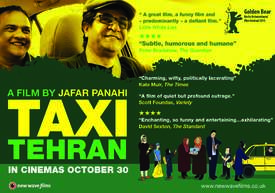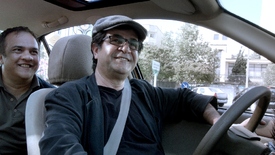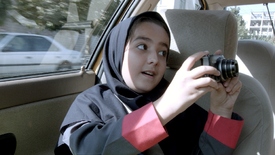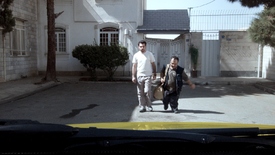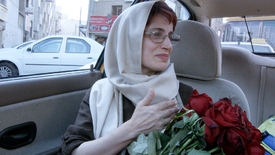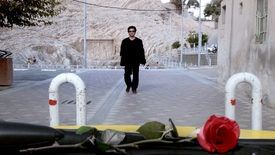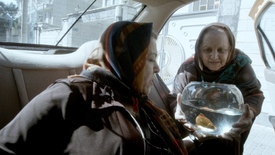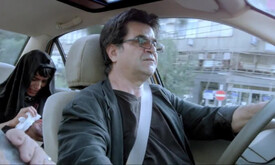Cinema Releases - Taxi Tehran
'I’m a filmmaker. I can’t do anything else but make films. Cinema is my expression and the meaning of my life. Nothing can prevent me from making films as when being pushed to the ultimate corners I connect with my inner self and in such private spaces, despite all limitations, the necessity to create becomes even more an urge. Cinema as an Art becomes my main preoccupation. That is the reason why I have to continue making films under any circumstances to pay my respect and feel alive.’ (Jafar Panahi)
Golden Bear & Fipresci Prize, Berlin Film Festival 2015
Director, author and producer, Jafar Panahi (b. 1960) is one of the most influential filmmakers in Iran today. He attended film school after serving in the army during the Iran-Iraq War. While making short films and television documentaries, he contacted Abbas Kiarostami to offer his services in any capacity. Kiarostami became an enthusiastic mentor, helping to get Panahi’s feature debut, The White Balloon, into Cannes, where it became the first Iranian film to win a major prize, the Camera d’Or (1995).
Like many Iranian directors, he began making films about children. The popularity of children as subjects stems in part from the existence of state funding for such films. They also serve to steer filmmakers clear of censorship problems that complicate the filming of any domestic or intimate scenes involving adult women. However, after his first two feature films, Panahi decided to tackle these complications head on by making The Circle, a devastating look at the strictures against women in contemporary Iran. This new tone of social critique continued in the unsettling Crimson Gold.
In the aftermath of the 2009 elections, Panahi was detained, sentenced to six years in prison, but then put under house arrest instead with a twenty-year ban on filmmaking, script writing, traveling outside of the country and giving interviews. His sentence of six years in prison still stands, and his past three films were made without authorization. This Is Not A Film (In Film Nist) premiered in Cannes (Special Screening), Closed Curtain (Pardé) won the Silver Bear for Best Script in Berlin, and Tehran Taxi, his latest film, won the Golden Bear in Berlin in 2015.
Panahi has won a number of human right prizes, including the Sakharov Prize for Freedom of Thought and The Medal of Art for Freedom.
|
Features |
|
|
|
|
|
2015 |
Taxi Tehran (Taxi) |
|
2013 |
Closed Curtain (Pardé) |
|
2011 |
This is Not a Film (In film nist) |
|
2006 |
Offside |
|
2003 |
Crimson Gold (Talaye sorkh) |
|
2000 |
The Circle (Dayereh) |
|
1997 |
The Mirror (Ayneh) |
|
1995 |
The White Balloon (Badkonake sefid) |
Written and directed by Jafar Panahi
Produced by Jafar Panahi Film Production (Tehran, Iran)
(No credits divulged)
Iran, DCP 2K, Colour, 82 Min., 2015
Certificate 12A
"Reviewing This Is Not a Film in 2012, the great Philip French commented, “There is unlikely to be a wittier, braver, more serious film shown in Britain this year.” Three years on, exactly the same can be said about Panahi’s latest."
Jonathan Romney, The Observer
"Jafar Panahi is the Iranian film-maker and democracy campaigner facing official harassment with unique wit, grace and humanity – all apparent in his new movie Taxi Tehran, whose quietly defiant good humour and charm will grow on you, as they grew on me when I first saw it in Berlin earlier this year. It is engaging and disarming: a freewheeling semi-improv piece of guerrilla film-making, cleverly staged and choreographed, with the discursive, digressive qualities of an essay film."
Peter Bradshaw, The Guardian
"Absolutely wonderful"
Catherine Shoard in The Guardian Film Show
★★★★★
"A movie — clandestinely made like its two precursors — of corrosive intelligence and gleaming courage."
Nigel Andrews, The Financial Times
★★★★
"Reveals Panahi at the top of his game"
Kate Muir, The Times
"Jafar Panahi’s latest offering is a playful journey through the capital of Iran and Iranian cinema itself"
Tim Robey, The Daily Telegraph
★★★★★
"A sly, subversive stand in favour of empathy."
Glenn Heath , Little White Lies
★★★★★
"With just three tiny cameras, a bunch of roses and no budget, this enchanting film shot in the back of a taxi shows how little you need to make a great movie."
David Sexton, The Evening Standard
★★★★
"His cheekiest and most playful subversion yet."
★★★★
"This is guerrilla film-making with a difference"
Geoffrey Macnab, The Independent
★★★★
"an intriguing portrait of a city and its people in which there is a good deal of wit and wisdom in the way individuals discuss justice, freedom and the way that technology could be a force for liberation in 21st-century Iran."
Allan Hunter, The Daily Express
"A grand panorama of city life, given shape by cruel oppression."
Danny Leigh, The Guardian - The Farsi and the Furious: Article on cars in film
Fugitive from censorship Jafar Panahi takes to the road
Trevor Johnston, Sight & Sound
"Oppression has transformed Panahi’s art. Under the pressure of circumstances, he has turned from a classicist into a modernist, while at the same time transforming the very codes and tones of his frame-breaking aesthetic."
Richard Brody, The New Yorker
★★★★★
'This spry, sharp and relentlessly clever middle finger to censorship is Panahi’s boldest act of defiance to date...
Taxi is a brilliantly humane testament to the fact that, in the 21st century, cinema is truly everywhere, and Jafar Panahi is still in the driver’s seat.
David Erlich, Time Out
"For the comic gem "Taxi," he adopts a playful mood and the guise of a cabdriver tooling through the streets of Tehran. It's an act of defiance that's also a sublime piece of cinema, and it ranks among the director's finest work."
Sheri Linden, The L.A. Times
'All this could have yielded something clammy and cloistered, just as Panahi’s status as a martyr for his art could have gulled him into loftiness and pride; and yet, by some miracle, “Taxi” stays as modest as his smile, the point being not to recruit us to his cause but to put us on the side of his compatriots. The mocking of oppression may be steely, but the film’s an easy ride.'
Anthony Lane, The New Yorker
'Once again creating cinema in spite of Iran's twenty-year edict forbidding him to do so, this most daring of directors, set free from house arrest, has ventured out into the streets of Tehran to document truths through fiction... Taxi is paced like a revue, with a showman's élan. The riders, all played by unidentified amateur actors, initiate comic and dramatic scenes that first reveal certain complexities of Iranian life.'
Allan Scherstuhl, Village Voice
'Here the act of filming the everyday is shown as hugely important, for it captures indispensable evidence of hidden truths in a society where image-making is subject to state suppression.'
Jonathan Romney, Film Comment“The genius of Jafar is that of course he’s working in the tradition of the Persian miniature,” said the theater director Peter Sellars, who introduced “Taxi” at the Telluride Film Festival this month. “You can do some tiny, tiny gesture which is a whole universe. And inside the miniature — a series of cab rides — is in fact a portrait of his whole country.”
From a background article in The New York Times by Rachel Doniado
★★★★
‘a beautifully humane fable… Taxi is a good-humoured jeu d’esprit, a piece of freewheeling cinephile activism, and a kind of career selfie’
Peter Bradshaw, The Guardian
'Charming, witty, politically lacerating'
Kate Muir, The Times
★★★★
'Enchanting, so funny and entertaining…exhilarating'
David Sexton, The Standard
'A great film, a funny film and — predominantly — a defiant film.'
★★★★★
'Most disarming about Panahi's viewpoint is how deftly he succeeds in shifting gears from light comedy to serious national issues. One conversation with a lawyer - like the filmmaker, banned from her profession - goes from family small-talk to hunger strikes.'
Ed Frankl, Cinevue
‘“Taxi” is talking about something much bigger than Panahi’s own personal situation, but rather the dilemma of how to keep telling meaningful stories in a country that places so many prohibitions on an artist’s ability to express him- or herself. The result is a film of quiet but profound outrage, laughing on the surface, but howling in anger just beneath.’
Scott Foundas, Variety
... 'a tactful but potent political comment as well as a supple, entertaining dramatic exercise.'
Stephanie Zacharek, The Village Voice
'He presents us with an infinite regression of setups, touching on both his own movies and the difficulties for any filmmaker of addressing Iranian “reality.”
Richard Combs, Film Comment
'warm, teasing and eye-opening.'
Deborah Young, The Hollywood Reporter
'Structurally, Taxi is a marvel, but also as an entertainment, it delivers in every one of its 82 minutes.'
David Hudson, Fandor
'Jafar Panahi's 'Taxi' is a Unique Cinematic Masterpiece...[T]his longtime alchemist of reality and fiction appears in full command of an exciting new mode of filmmaking devised in answer to the stifling constraints on his creativity.'
Kevin B. Lee for Indiewire
'a delightful surprise... a priceless cinematic lesson, proving once again that if you know what you want and how to express it, the whole mystical paraphernalia of filmmaking and its inflated budgets is not really necessary.'
Dan Fainaru, Screen
'an embracing enjoyment of people, of traveling and seeing and hearing people... A supremely simple and direct film, it cuts you immediately and straight to the heart.'
Daniel Kasman, MUBI
'Taxi is a perfect complement to its predecessors, adding another chapter to Panahi’s exceptional and thoroughly stirring exercise in meta-filmmaking.'
Giovanni Marchini Camia, The Film Stage
Clip 1 - "You a cabbie? No way Mr Panahi" on Vimeo or Youtube
Clip 2 - "Avoid sordid realism" on Vimeo or Youtube
Clip 3 - "We know they're watching" on Vimeo or Youtube
(Vimeo clips can be downloaded)
Download hi-res jpeg of Quad Poster
Trailer on Vimeo (can be downloaded) or Youtube
Download photos: photo 1 photo 2 photo 3 photo 4 photo 5J
Jafar Panahi's statement
Article in Le Monde speaking to Jafar Panahi's daughter - English translation
Interview with Pooya Abbasian, involved in the post production
Swiss educational pamphlet (in French)
Cars in the movies - some free-wheeling association by Danny Leigh in The Guardian
